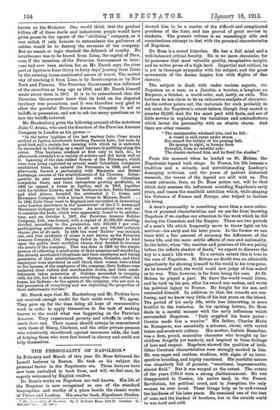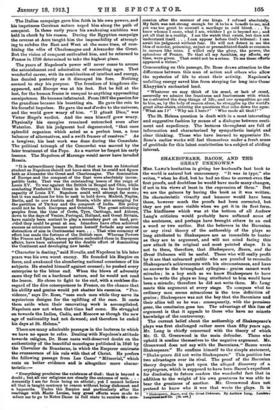THE PERSONALITY OF NAPOLEON.* IN February and March of this
year Dr. Rose delivered the Lowell lectures in Boston. He took as his subject the personal factor in the Napoleonic era. These lectures have now been embodied in book form, and will, we feel sure, be eagerly welcomed by English readers.
Dr. Rose's works on Napoleon are well known. His life of the Emperor is now recognized as one of the standard biographies, and worthy of a place beside the classic works of Thiers and Lanfrey. His smaller book, Napoleonic Studies,
showed him to be a master of the difficult and complicated problems of the time, and has proved of great service to students. The present volume is an exceedingly able and conscientious attempt to deal with the personal characteristics of Napoleon.
Dr. Rose is a sound historian. He has a full mind and a well-balanced critical faculty. He is no mere chronicler, for he possesses that most valuable quality, imaginative insight,
and he writes prose of a high level. Impartial and critical, he is yet in thorough sympathy with his subject, and the great movements of the drama inspire him with flights of fine rhetoric.
The subject is dealt with under various aspects, viz.
Napoleon as a man, as a Jacobin, a warrior, a lawgiver, an Emperor, a thinker, a world-ruler, and, lastly, an exile. The lectures do not claim to be an exhaustive analysis of character. As the author points out, the materials for such probably do not exist, for Napoleon's extant letters, though they exceed in number 32,000, deal for the most part with facts, and are of little service in explaining the variations and contradictions which invest his personality with an elusive charm. And there are other reasons.
From the moment when he landed on St. Helena the
Napoleonic legend took shape. In France, his life became a tradition and a miracle, and notwithstanding Lanfrey's damaging criticism and the years of patient historical research, the traces of the legend are still with us. The truest estimate, then, as Dr. Rose points out, will be that which duly assesses the influences moulding Napoleon's early years, and traces the manifold activities which, while shaping the fortunes of France and Europe, also helped to fashion his being.
A man's personality is something more than a mere collection of personal characteristics, and we are far from knowing Napoleon if we confine our attention to the work which he did during the Consulate and the Empire. There are two periods of a man's life which frequently serve to throw light on his motives—his early and his later years. In the former we can trace with a fair amount of accuracy the influences of the home life, and the more subtle effects of race and nationality.
In the latter, when "the vanities and passions of life are paling before the infinite shadow of death," we expect to discover the key to a man's life-work. To a certain extent this is true in the case of Napoleon. St. Helena no doubt was an admirable opportunity for showing himself to the world in his true guise. As he himself said, the world could now judge of him naked as he was. This, however, is far from being the case. At St. Helena he played a part. He knew the world would listen, and he took up his pen, after his sword was useless, and wrote his political legacy to France. He fought for his son, and concealed himself. In addition to that, the records are con fusing, and we know very little of his last years on the island. The period of his early life, while less interesting, is more fruitful to the historian. In his opening lecture, Dr. Rose deals in a careful manner with the early influences which surrounded Napoleon. "Italy supplied his brain power : Corsica made him a warrior." His father, Charles Marie de Bonaparte, was essentially a schemer, clever, with varied tastes and academic culture. His mother, Letizia Ramolino, was a firm, proud, masculine character who brought up her children frugally yet tenderly, and inspired in them feelings of love and respect. Napoleon showed the qualities of both. Other Corsican characteristics were strongly marked in him. He was eager and restless, studious, with signs of an intro spective brooding, and highly emotional. His youthful nature was singularly full of promise, "emotional, impressionable, almost fluid." But it was warped at the outset. The events of the years 1793-9 were a strong disillusionment. He was disappointed in Corsica, his native land, in the French Revolution, his political creed, and in Josephine, the only woman he ever loved. These things help us to und-rstand the hardness of his later years. He remained one of the best of sons and the kinde.t of brothers, but to the outside world be was hard and cold. The Italian campaign gave him faith in his own powers, and his impetuous Corsican nature urged him along the path of conquest. In these early years his awakening ambition was held in check by his reason. During the Egyptian campaign the reverse at Acre taught him the impossibility of attempting to subdue the East and West at the same time, of combining the roles of Charlemagne and Alexander the Great. But the vision of conquest enthralled him, and he returned to France in 1799 determined to take the highest place.
The years of Napoleon's power wilt never cease to arouse the astonishment and admiration of succeeding ages. That wonderful career, with its combination of intellect and energy, has dazzled posterity as it dismayed his foes. Nothing seemed to stay his purpose. The frontiers of kingdoms disappeared, and Europe was at his feet. But he fell at the last, for the human frame is unequal to anything approaching omnipotence. He became infatuated. From 1807 the passion for the grandiose became his besetting sin. He gave the rein to his forceful impulses. He gave the snot d'ordre to the universe,
and the world grew weary of him. "Ii genait Dieu," was -Victor Hugo's verdict. And the man himself grew weary. Physically his energies remained untouched even after Waterloo. But his judgment had degenerated, 'that once
splendid organism which acted as a perfect lens, a true balancer of alternatives, and a swift framer of resolves." As a lawgiver, his best work was done during the Consulate. The political triumph of the Concordat was marred by the later treatment of the Pope. As a warrior he forgot his early lessons. The Napoleon of Marengo would never have invaded Russia.
"It is extraordinary (says Dr. Rose) that so keen an historical student as Napoleon should not have seen that he could not figure both as Alexander the Great and Charlemagne. The domination of Europe and the conquest of the East were absolutely incompatible tasks. That was the outstanding lesson of the reign of Louis XV. To war against the British in Bengal and Ohio, while combating Frederick the Great in Germany, was far beyond the capacity of Louis XV. Napoleon could well attempt far more ; but it was madness for him to seek to bold down Madrid, Naples, Berlin, and to cow Austria and Russia, while also arranging for the partition of Turkey and the conquest of India. His policy could not be both European and Oriental. The great colonizing peoples from the time of Crete, Tyre, Carthage, and Athens, down to the days of Venice, Portugal, Holland, and Great Britain, have mainly been content to play a secondary part on land, proqided they could be great at sea. Islanders have often achieved success as colonizers because nature herself forbade any serious distraction of aim in Continental wars... . That wise economy of effort has made the fortune of the British race. Whereas Powers like France and Spain, whose position embroiled them in European affairs, have been exhausted by the double effort of dominating the Continent and developing new lands."
"Character is destiny," said Novalis, and Napoleon in his later years was his own worst enemy. He founded his Empire on force, and awakened the slumbering national conscience of his subjects. He steeled himself against counsel; he pushed every enterprise to the bitter end. When the blows of adversity came they fell on a hardened nature, and he would not read the lesson. He chose to fight to the end, with a reckless disregard of the dire consequences to France, on the chance that his ability and genius would yet shatter his enemies. " Providence," says Dr. Rose, "uses such men while they serve its mysterious designs for the uplifting of the race. It casts them aside when their renovating work is accomplished. Napoleon saw not when that time had come. He struggled on towards the Indies, Cadiz, and Moscow as though the new age of nationality had not dawned; and therefore he ended his days at St. Helena."
There are many admirable passages in the lectures to which we have no space to refer. Dealing with Napoleon's attitude towards religion, Dr. Rose casts well-deserved doubt on the authenticity of the beautiful monologue published in 1840 by the Chevalier de Beauterne, in which the Emperor contrasts the evanescence of his rule with that of Christ. He prefers the following passage from Las Cases' "Memorial," which rests on better evidence and is altogether more characteristic:—
"Everything proclaims the existence of God : that is beyond a, doubt ; but all our religions are clearly the outcome of men. . . . Assuredly I am far from being an atheist; yet I cannot believe all that is taught contrary to reason without being dishonest and a hypocrite. 'Under the Empire and particularly after the marriage with Marie Louise, very great efforts were int& to nduce me to go to Notre Dame in full stato to receive th com munion after the manner of our kings. I refused absolutely. My faith was not strong enough for it to be a benefit to me, arid yet was too great to commit a sacrilege in cold blood. . . . To know whence I came, what I am, whither I go is beyond me ; and yet all that is a reality. I am the watch that exists, but does not understand itself. . . . I can appear before God's tribunal : I can await his judgment without fear. He will not detect in me the idea of murder, poisoning, unjust or premeditated death so common in careers like mine. I willed only the glory, the power, the splendour of France. To that all my faculties, my efforts, my. time, were given. That could not be a crime. To me these efforts appeared a virtue."
Commenting on this passage, Dr. Rose draws attention to the difference between this man of action and others who allow the mysteries of life to stunt their activity. Napoleon's unfailing energy saved him from straying for long into Omar Khayy3,na's enchanted land.
"Whatever we may think of his creed, or lack of creed, assuredly we admire the frankness and fearlessness with which he confronted the deep things of life; and our sympathies go out to him, as, by the help of reason alone, he struggles up the world's great altar-stairs, uttering the questions that echo down the ages: What am I ? " Why OM I hero ? " Who made all that ?'
The St. Helena question is dealt with in a most interesting and suggestive fashion by means of a dialogue between sentiment and expediency. The lectures throughout are full of information and characterized by sympathetic insight and clear thinking. Those who have learned to appreciate Dr. Rose's earlier works will feel themselves under a fresh sense of gratitude for this latest contribution to a subject of abiding interest.







































 Previous page
Previous page